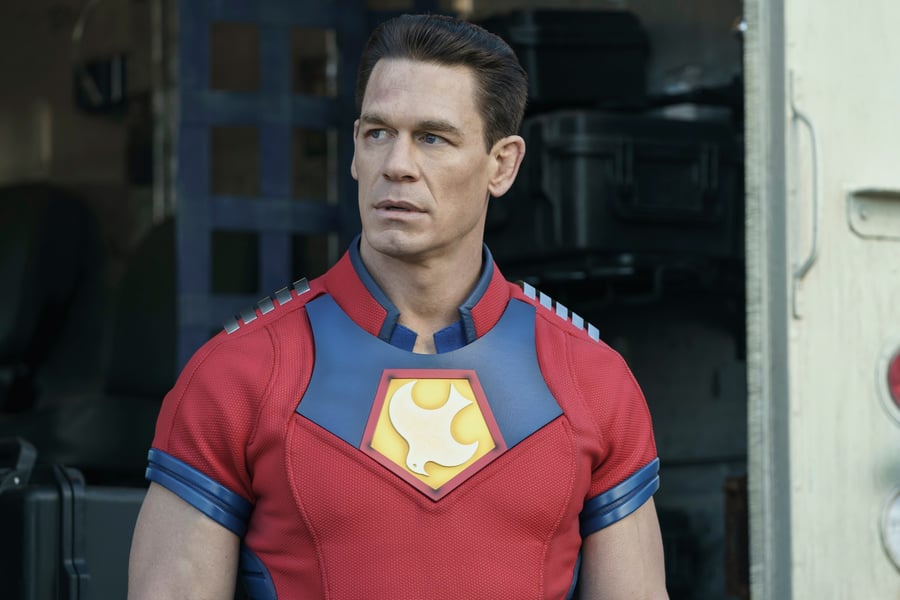Any doubt that HBO Max’s Peacemaker series would have the same energy, style, and sense of humor that writer-director James Gunn brought to last year’s feature film The Suicide Squad is dispelled within seconds of the superhero show’s opening-credits sequence. It is essentially an Eighties-style music video, with the homicidal title character, played once again by John Cena, and his supporting cast performing a choreographed dance number on a neon-lit stage while the Norwegian glam-metal band Wig Wam’s song “Do Ya Wanna Taste It” shreds in the background.
It’s the kind of inspired gag that makes a mockery of the Skip Intro option, remaining a delight every single time it comes up. But then, the same could be said for ol’ bucket-headed Peacemaker himself. He was one of many amusing flavors in Gunn’s mocking take on Suicide Squad, and here he ably carries the whole ridiculous yet also thrilling and sad endeavor. He’s the star of an unapologetic parody of superhero shows that’s also a pretty good superhero show in its own right.
In the movie, Peacemaker was an alt-right caricature, and ultimately an antagonist to the more sympathetic Squadders. Here, he is given friends, including Freddie Stroma as a fellow homicidal vigilante called, well, Vigilante, and Danielle Brooks, Jennifer Holland, Steve Agee, and Chukwudi Iwuji as spies who recruit Peacemaker to take down a mysterious threat to America. And he is given both context and surprising amounts of sympathy, as we see that his father, Auggie (Robert Patrick, going for it), is an abusive white supremacist who loudly declares that he should have slit his son’s throat at birth. Peacemaker is a trash person, but he was raised to be that way, and the show makes him just repentant and self-aware enough for him to function as the hero of this extremely odd story. “Lately, I just think I’m a fucking maniac,” he confesses to Vigilante. “I’m having feelings about things.”
Those moments of reflection wind up complementing the comedy rather than undercutting it. Peacemaker remains an insensitive moron much of the time, admitting, for example, in one episode that for years he believed his older brother’s explanation that ugly children were “butt babies” who came out of their mothers’ rear ends. By now it’s not a surprise that Cena is a gifted comic actor — more versatile and game than Dwayne Johnson, even if the Rock’s magnetism is undeniable — and Gunn (who writes and/or directs most of the episodes himself) leans on his star’s verbal gifts as much as his physical ones. Those opening credits are far from the last time we see Cena dancing with hilarious abandon (often to more Scandinavian throwback rock, and at least once in nothing but a pair of tighty-whities), but he’s also great in scenes where Peacemaker’s mouth gets him into trouble, like when he starts arguing with grade schoolers while he’s a special guest at show-and-tell. He is a (really) overgrown child, and the series acknowledges this even as it lets co-stars like Brooks (Orange Is the New Black) or fellow Suicide Squad alums Holland and Agee shine. Stroma (who usually just plays dashing, handsome men in dramas like Bridgerton) is especially ridiculous in portraying Vigilante as a worst-case scenario for what Peacemaker could be.
Vigilante already appeared in dead-serious form on the CW’s Arrow, played by a different actor. But like its comrade in HBO Max weirdness Doom Patrol, Peacemaker takes a fundamentally irreverent approach to the superhero genre as a whole and to DC Comics in particular. Peacemaker claims that Superman has a poop fetish and name-checks obscure comics characters like Bat-Mite and Matter-Eater Lad. Where Disney+ shows like Loki are cogs in a much larger Marvel storytelling machine, Gunn seems to have been left alone in his own filthy corner of the DC universe. Each episode features a post-credits scene, but rather than tease characters from upcoming shows and movies, they’re just extended versions of comedy bits from earlier in the hour.
The budget is clearly more modest than the ones Gunn had to work with in Suicide Squad or the Guardians of the Galaxy films, making for a striking contrast in production values whenever we get flashback clips from Peacemaker’s big-screen adventure. But Gunn remains an inventive writer and director of action even within these limitations, and each episode features at least one absurdly choreographed fight scene, whether it’s the lumbering Peacemaker struggling against the diminutive but quick Judomaster (Nhut Le), or Peacemaker getting some graphically violent assistance from his pet eagle/best friend, Eagly (a marvelous CGI creation). It is not a show for the faint of heart, though Gunn and his collaborators frequently manage to make the gore part of the joke.
Between the blood and guts, the slapstick, the political satire (Peacemaker’s two favorite words often seem to be “deep state”), and the musical digressions (including a married couple debating the merits of Cinderella versus Foster the People during a hostage situation), there is a lot going on here. Yet the series functions as a sincere character study of its flawed hero — and the unfortunate souls who have to work alongside him — just enough for the joke to never quite wear thin. Even in a wildly oversaturated market for tales of hypermuscular men and women punching their way to justice, Peacemaker stands out. You’ll wanna taste it, even the parts that are in incredibly bad taste.
Love Music?
Get your daily dose of everything happening in Australian/New Zealand music and globally.
The first three episodes of Peacemaker premiere Jan. 13 on HBO Max, with the remaining installments releasing weekly. I’ve seen the first seven of eight episodes.
From Rolling Stone US



































